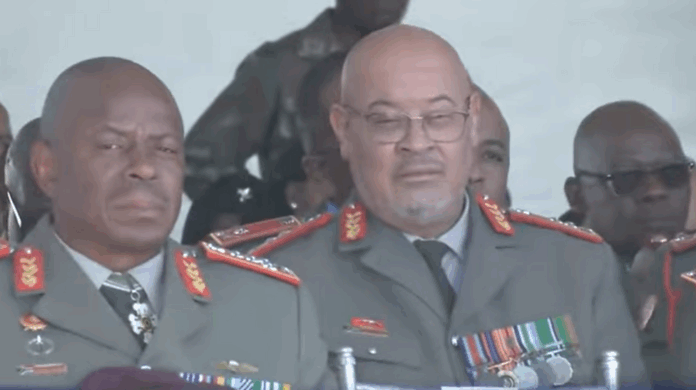
SA Top General, Rudzani Maphwanya, Chief of the South African National Defence Force (SANDF), conducted a controversial high-profile visit to Tehran, Iran, aimed at advancing military and strategic cooperation between the two nations. The visit unfolded as a significant but contentious episode, spotlighting South Africa’s evolving global alignments and the delicate balance between military diplomacy and government foreign policy.
Purpose and Key Discussions
General Maphwanya’s visit, described by both sides as a turning point in Tehran–Pretoria relations, focused on concrete steps toward enhancing military cooperation. Meetings with Iranian top military officials, including Major General Abdolrahim Mousavi, Chief of Staff of the Iranian Armed Forces, Major General Amir Hatami, Commander of the Iranian Army, and Second Brigadier General Hossein Valivand-Zamani, Commander of Iran’s Dafoos (Army Command and Staff University), underscored a shared commitment to collaboration in military training, research, and academic exchanges.
The South African general toured Dafoos, Iran’s advanced military research and development center, praising its capabilities and expressing enthusiasm about programs starting in September 2025 to facilitate student and faculty exchanges between the two countries. Iranian officials offered to share their technical and industrial military expertise, particularly highlighting the Islamic Revolutionary Guard Corps (IRGC) as the world’s largest anti-terrorism force with valuable operational experience.
Discussions also emphasized ideological solidarity around anti-colonialism and support for oppressed nations, a nod to the historical ties rooted in Iran’s support during South Africa’s anti-apartheid struggle. South Africa’s pursuit of a genocide case against Israel at the International Court of Justice (ICJ) was lauded by Iranian leaders as a courageous stance aligned with justice-oriented policies.
Timeline of Key Events (August 2025)
-
On or before August 12, 2025: General Maphwanya arrives in Tehran for multi-day military cooperation meetings.
-
August 12, 2025: Meetings with Iranian senior military officials at Dafoos; tours and discussions on training, research, and academic exchanges kick off.
-
August 12, 2025: Maphwanya delivers a joint press conference expressing solidarity with Iran on political issues including Palestine, framing the visit as a political statement.
-
August 13, 2025: Reports and analysis spark national debate, with leading defense experts criticizing the general’s overreach.
-
August 13, 2025: DIRCO, Ministry of Defence, and the Presidency release statements distancing government policy from Maphwanya’s remarks.
-
August 13, 2025: The DA publicly demands Maphwanya’s court-martial for breach of military neutrality.
-
August 14, 2025: Official reprimand of Maphwanya reported, underscoring the political sensitivity of his comments.
Political Statements and Controversy
Beyond military cooperation, Maphwanya’s public remarks introduced unexpected political dimensions that sparked intense backlash. He framed the visit as a “political message” expressing solidarity with the “peace-loving nation of Iran” and condemned Israeli actions in Gaza, expressing “disgust” at the situation. He drew parallels between South Africa’s anti-apartheid struggle and Iran’s revolutionary ideals, likening Nelson Mandela and Iran’s Imam Khomeini as sharing visionary leadership committed to liberation.
These statements, amplified by Iranian state media, elicited praise from Iranian generals, with Major General Hatami commending South Africa’s “courageous and commendable” stance against the U.S. and Israel. However, this overt political alignment caused alarm at home, given the sensitive timing amid ongoing negotiations with the United States to reduce punitive tariffs on South African exports—a 30% tariff that threatens thousands of jobs in the country.
Government and Political Response
South Africa’s Department of International Relations and Cooperation (DIRCO), Ministry of Defence, and the Presidency swiftly moved to disavow Maphwanya’s political comments. DIRCO’s spokesperson emphasized that foreign policy is the exclusive purview of the Presidency and DIRCO, not the military. The Presidency confirmed the visit was not sanctioned by President Cyril Ramaphosa, underscoring a lack of coordination and distancing the government from the general’s remarks.
The opposition Democratic Alliance (DA) vehemently condemned the visit and the statements made by Maphwanya, labeling them “reckless grandstanding” and a breach of military neutrality. The DA called for Maphwanya’s immediate court-martial, arguing that his actions undermine constitutional civilian control over the military and jeopardize essential trade relations with democratic allies, particularly the United States.
Defense analysts echoed these concerns, warning that unsanctioned political statements from the head of the SANDF set a “dangerous precedent” that risks politicizing the military and causing diplomatic fallout. DIRCO underscored that steps would be taken to prevent recurrence of such incidents and maintain clear boundaries between military leadership and foreign policy authority.


























